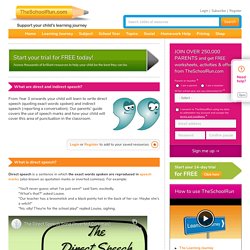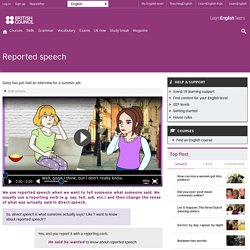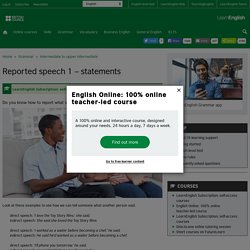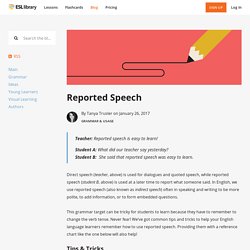

Telephone messages. You said. Double trouble. Let’s Be Indirect: Teachers’ Top 9 Fun and Creative Activities for Practicing Reported Speech. “He Said What?” Top 9 ESL Activities for Reported Speech. Say Vs. Tell and Other Speaking Verbs – Blog – ESL Library. English language learners often struggle with verbs about speaking.

Say and tell have similar meanings, but their sentence patterns can be difficult for students to keep straight. Since these verbs don’t often appear in textbooks, it’s a good idea to present or review the patterns and punctuation of these verbs to learners of any level. Reported Speech Say is followed by something, not someone. Direct Speech Say is very common in direct speech. Tell is followed by someone, not something. Tell is not common in direct speech, though it is possible.
“That was a good movie,” he told me quietly. To express that someone is asking a question, we use the verb ask, followed by if, whether, for, about, or a question word. She asked if she could borrow my pen.She asked whether she could borrow my pen.She asked for the time.She asked about the weather.She asked where the restaurant was.She asked what my name was. She asked, “What’s your name?” Questions Answers toldsaidsaidtoldsaid.
Direct speech and indirect speech explained for primary school parents. What is direct speech?

Direct speech is a sentence in which the exact words spoken are reproduced in speech marks (also known as quotation marks or inverted commas). For example: "You'll never guess what I've just seen! " said Sam, excitedly. "What's that? " Reported Speech English Grammar Game for kids. Reported speech. Sophie: Mmm, it’s so nice to be chilling out at home after all that running around.

Ollie: Oh, yeah, travelling to glamorous places for a living must be such a drag! Ollie: Mum, you can be so childish sometimes. Hey, I wonder how Daisy’s getting on in her job interview. Sophie: Oh, yes, she said she was having it at four o’clock, so it’ll have finished by now. That’ll be her ... yes. Daisy: Well, good I think, but I don’t really know. Sophie: What kind of thing did they ask you? Daisy: They asked if I had any experience with people, so I told them about helping at the school fair and visiting old people at the home, that sort of stuff. Sophie: I’m sure what you said was impressive.
Daisy: And then they asked me what acting I had done, so I told them that I’d had a main part in the school play, and I showed them a bit of the video, so that was cool. Sophie: Great! Grammar - Intermediate to upper intermediate. Look at these examples to see how we can tell someone what another person said.

Fun ways of practising Reported Speech. 1. Reported speech reversiPrepare cards with reported speech on one side and direct speech of the same sentence on the other. Students have to correctly say what is on the other side to turn it over and score one point. There are many games you can play with these cards, including the TEFL version of Reversi/ Othello that was first described by Mario Rinvolucri in Grammar Games and that is the subject of an upcoming article of mine. 2.
Go betweensThis is also a game from a classic TEFL supplementary book that can easily be done without access to the book (in this case Intermediate Communication Games). Reported Speech – Blog – ESL Library. Teacher: Reported speech is easy to learn!

Student A: What did our teacher say yesterday? Student B: She said that reported speech was easy to learn. Direct speech (teacher, above) is used for dialogues and quoted speech, while reported speech (student B, above) is used at a later time to report what someone said. In English, we use reported speech (also known as indirect speech) often in speaking and writing to be more polite, to add information, or to form embedded questions. This grammar target can be tricky for students to learn because they have to remember to change the verb tense. Remember to back it up! Simple present becomes simple pastsimple past becomes past perfectpresent progressive becomes past progressive, etc. The relative pronoun that used after the reporting verb is optional, but commonly used. John said that he would help me with my homework.John said he would help me with my homework. Use said without a direct object. Use told with a direct object.